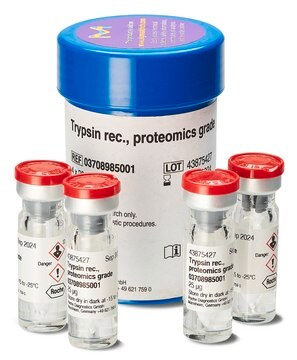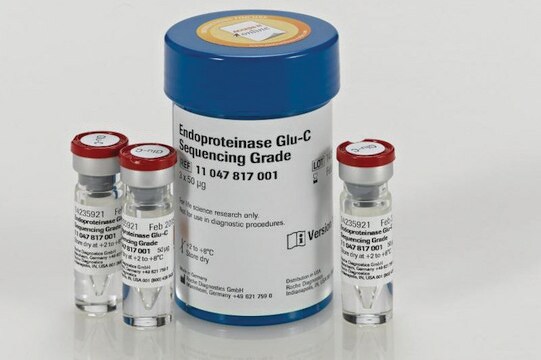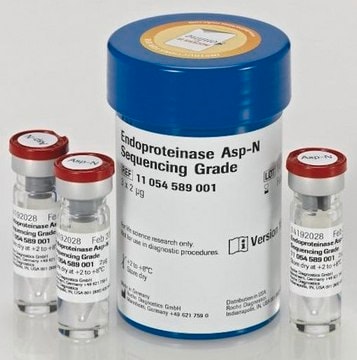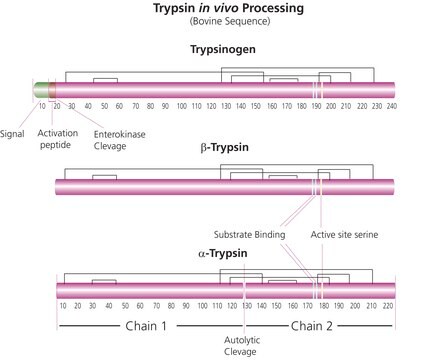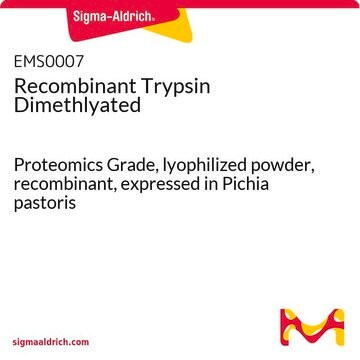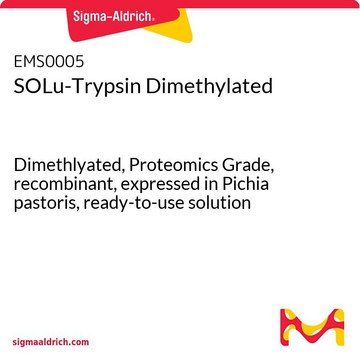TRYPSEQM-RO
Roche
Trypsin Sequencing Grade, modified
from bovine pancreas
Sinónimos:
Trypsin
About This Item
Productos recomendados
origen biológico
bovine pancreas
Nivel de calidad
grado
protein sequencing grade
formulario
lyophilized (salt-free)
mol peso
24.000 g/mol
envase
pkg of 4 × 100 μg (11418033001)
pkg of 4 × 25 μg (11418025001)
fabricante / nombre comercial
Roche
condiciones de almacenamiento
(Keep container tightly closed in a dry and well-ventilated place.)
concentración
0.01-0.2 % (w/w)
técnicas
protein sequencing: suitable
impurezas
Chymotrypsin
color
white
pH óptimo
8.0
solubilidad
10 g/L
idoneidad
suitable for protein modification
Nº de acceso UniProt
aplicaciones
life science and biopharma
actividad extraña
Contaminating activities corresponds
Chymotrypsin , contains
temp. de almacenamiento
2-8°C
Información sobre el gen
cow ... PRSS1(780933)
Descripción general
Trypsin is a highly efficient and specific protease widely used in proteomics for protein digestion. It produces short peptides with specific characteristics that are compatible with current separation and identification methods such as liquid chromatography, mass spectrometry (MS).
Inhibitors: TLCK, DFP, PMSF, leupeptin, soybean trypsin inhibitor, trypsin inhibitor from hen egg, aprotinin, α2-macroglobulin,α1-antitrypsin, APMSF, and antipain.
Especificidad
Aplicación
It is used for:
- Protein-structure elucidation
- Tryptic mapping
- Fingerprinting analysis
- Sequence analysis
- Translocation studies
- Protein identification
- Protein digestion during lipoprotein preparation for liquid chromatography-tandem mass spectrometry (LC-MS/MS)
Calidad
Nota de preparación
Storage conditions (working solution): -15 to -25 °C
Trypsin Sequencing Grade, modified, is more resistant to autolysis, even at pH values in the neutral and weakly basic range. The enzyme can be used in high concentrations.
A solution in 1% acetic acid or 1 mM HCI can be used for up to one week when stored at 2 to 8° C. Stored in aliquots at -15 to -25 °C, the solution is stable for at least one year without loss of activity.
Almacenamiento y estabilidad
Otras notas
Palabra de señalización
Danger
Frases de peligro
Consejos de prudencia
Clasificaciones de peligro
Eye Irrit. 2 - Resp. Sens. 1 - Skin Irrit. 2 - STOT SE 3
Órganos de actuación
Respiratory system
Código de clase de almacenamiento
11 - Combustible Solids
Clase de riesgo para el agua (WGK)
WGK 1
Punto de inflamabilidad (°F)
Not applicable
Punto de inflamabilidad (°C)
Not applicable
Certificados de análisis (COA)
Busque Certificados de análisis (COA) introduciendo el número de lote del producto. Los números de lote se encuentran en la etiqueta del producto después de las palabras «Lot» o «Batch»
¿Ya tiene este producto?
Encuentre la documentación para los productos que ha comprado recientemente en la Biblioteca de documentos.
Los clientes también vieron
Nuestro equipo de científicos tiene experiencia en todas las áreas de investigación: Ciencias de la vida, Ciencia de los materiales, Síntesis química, Cromatografía, Analítica y muchas otras.
Póngase en contacto con el Servicio técnico
